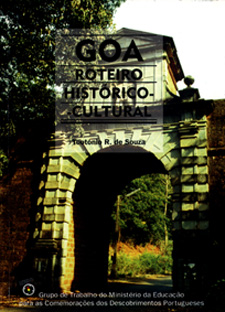GOA GUIDE

Goa: Roteiro Histórico-Cultural
Teotonio R. de Souza
Lisboa, Ministério da Educação: Grupo de Trabalho para as Comemorações dos
Descobrimentos Portugueses, 1996, ISBN 972-8186-28-2,
pp.207. Maps:8, Illustr: 21, Graphs: 4.
Excerpts of the Preface (translated from Portuguese original)
TO SEE AND FEEL GOA
....We have tried to present in this historical-cultural guide of Goa the
vestiges of four and half centuries old portuguese presence as it lies
embedded in the multisecular base of the Indian culture. This means that we
are not going to accompany the portuguese visitors to look simply at a series
of «sites, monuments and other objects, but first and foremost to get a feel
and to begin to understand a people in their home - Goans in Goa.
In order to make this possible, we had to assume that Goa and Goans had a long
past that anteceded the arrival of the Portuguese there, and which continued
after the Portuguese vacated the land. The portuguese presence is thus viewed
in a wider context of Goa´s historical and cultural past. If 500 years ago
the Portuguese took interest in Goa and in Goans for strategic reasons and for
exploiting them, the Portuguese of today can return there to seek to understand the Goans and to dialogue with them over issues and concerns of mutual interest.
This can be possible only when Goa and Goans are seen in their historical and
cultural contexts. That is the reason for the three introductory chapters in
this guide-book:
1. Goa in its pre-historica and historic march;
2. Goa: its ecology and some socio-economic indicators;
3. Goa: a cultural fusion in evolution .
... The Portuguese visitors to Goa can rightfully feel proud of the
contribution made by Portugal to the Goan identity. Fully aware of the
Portuguese historic conscience and all the elements that marred the process of
its evolution, the Portuguese journalist Miguel de Sousa Tavares wrote
poignantly in the travel magazine «Grande Reportagem» after a brief visit to
Goa in 1992: «It is possible to love what one does not possess, and it is
possible to serve what no longer belongs to us. The end-goal of peoples is not
to have empires, but to have memories».
... We wish that this manual guide will aid the discovery and recovery of those
memories of the challenges that Portugal and the Portuguese faced in the
headquarters of their former Estado da Índia, their old eastern empire, which
inspired the epic of Camões and also caused frustrations to him and his
fellow-countrymen. The «glories» and the «fumes of Indies», the «allurements and
disenchantments» constitute and will remain essential components of the
Portuguese historical memories.
Teotónio R. de Souza
BACK TO RECENT PUBLICATIONS



